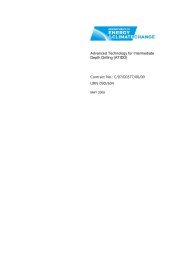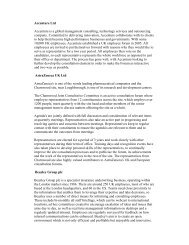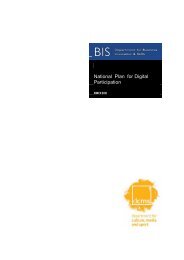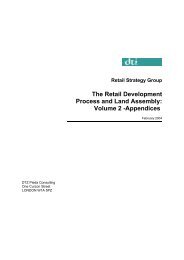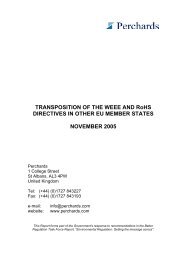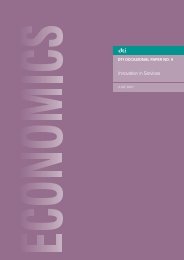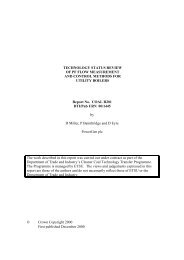Public Policy: Using Market-Based Approaches - Department for ...
Public Policy: Using Market-Based Approaches - Department for ...
Public Policy: Using Market-Based Approaches - Department for ...
Create successful ePaper yourself
Turn your PDF publications into a flip-book with our unique Google optimized e-Paper software.
annual EPA auctions were successful in bringing parties to the market and<br />
helping to establish a range of market valuations, prerequisites <strong>for</strong> the<br />
development of private market trading activity.<br />
Newell and Rogers (2003) assess the US tradeable permit scheme <strong>for</strong> reducing<br />
lead in gasoline. In this scheme in the 1980s, permits <strong>for</strong> lead levels were<br />
assigned to refineries that could either trade these between themselves or ‘bank’<br />
them <strong>for</strong> later use. 48 They conclude that the program was effective in meeting<br />
environmental objectives, and that allowing permit banking contributed to the<br />
speed with which these objectives were obtained. The market-based program<br />
provided incentives <strong>for</strong> more efficient adoption of lead-removing technology<br />
relative to a uni<strong>for</strong>m standard, and thereby minimised the costs of the lead<br />
phase down.<br />
Although the potential <strong>for</strong> cost savings is substantial, the extent to which these<br />
have been realised varies widely across different schemes, suggesting that<br />
design is critical to success. Hahn (1989) assesses the evidence on experience<br />
with marketable permits in this light and finds that the capacity to monitor and<br />
en<strong>for</strong>ce a scheme can dramatically affect its per<strong>for</strong>mance. 49 Where monitoring is<br />
easy within the existing regulatory infrastructure and there is agreement from<br />
the outset about the allocation of property rights, realised cost savings will be<br />
closer to their theoretical potential. These features characterised the lead permit<br />
trading programme in the US, which enjoyed a high level of trading activity and<br />
savings in excess of $228 million from the permit banking rule alone. This<br />
per<strong>for</strong>mance is in contrast to the Wisconsin Fox River water permits scheme,<br />
which saw only one trade during the first six years of operation and there<strong>for</strong>e<br />
minimal cost savings despite the potential <strong>for</strong> $7m per annum. Savings from the<br />
US emissions trading programme have amounted to billions of dollars, but they<br />
have arisen mainly from the internal trading of permits. Increased external<br />
trading would lead to greater savings still, but is discouraged by high<br />
transactions costs.<br />
APPLICATIONS<br />
Section 7 – <strong>Market</strong>-<strong>Based</strong> Mechanisms<br />
<strong>Market</strong>able permits have been used mainly in the field of pollution control. In<br />
this system, a limit is set on total emissions levels. This level can then be altered<br />
over time to meet the required emissions target. This system has been used in<br />
a number of different environmental control schemes since the 1970s.<br />
During the 1970’s, the Environmental Protection Agency (EPA) in the US, in<br />
compliance with the Clean Air Act of 1970, set standards to protect public health<br />
<strong>for</strong> ozone, sulphur dioxide, lead, particulate matter, nitrogen dioxide and carbon<br />
monoxide. It designated metropolitan areas that did not comply with these<br />
48 Newell, R. and K. Rogers( 2003) ‘The market-based lead phasedown’, RFF discussion paper 03-37.<br />
49 Hahn, R. (1989) ‘Economic Prescriptions <strong>for</strong> Environmental Problems: How the Patient Followed the Doctor’s<br />
Orders’, Journal of Economic Perspectives 3(2).<br />
59



